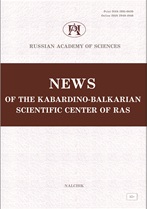|
System analysis, management and information processing
Basic methods and approaches
to artificial consciousness modeling
I. A. Pshenokova
Institute of Computer Science and Problems of Regional Management –
branch of Federal public budgetary scientific establishment "Federal scientific center
"Kabardino-Balkarian Scientific Center of the Russian Academy of Sciences", Nal'chik, 360000, Russia, Nalchik, 37-a I. Armand street
Abstract:
The article provides a brief analysis of some methods and approaches to the modeling of
artificial consciousness. Some approaches to the definition of consciousness in philosophy, psychology
and neurobiology are presented. In particular, functional and neurobiological models of consciousness are
considered. Some approaches to artificial consciousness modeling are presented. The considered models
fully satisfy the purpose for which they were created, however, none of them yet shows the real creation
of personal preferences acquired and processed through the agent's body and emotions, which are considered the basis for the creation of a potential artificial consciousness. This area of general artificial intelligence is actively developing and there is still no unified theory of the fundamental principles and methods
for creating intelligent systems that are conscious, capable of understanding their actions and goals, as
well as self-awareness.
Keywords:
artificial intelligence, consciousness, artificial consciousness, robotics, simulation.
Received: 11.02.2022
Accepted: 10.03.2022
Citation:
I. A. Pshenokova, “Basic methods and approaches
to artificial consciousness modeling”, News of the Kabardino-Balkarian Scientific Center of the Russian Academy of Sciences, 2022, no. 2, 72–81
Linking options:
https://www.mathnet.ru/eng/izkab429 https://www.mathnet.ru/eng/izkab/y2022/i2/p72
|


| Statistics & downloads: |
| Abstract page: | 60 | | Full-text PDF : | 50 | | References: | 19 |
|





 Contact us:
Contact us: Terms of Use
Terms of Use
 Registration to the website
Registration to the website Logotypes
Logotypes







 Citation in format
Citation in format 